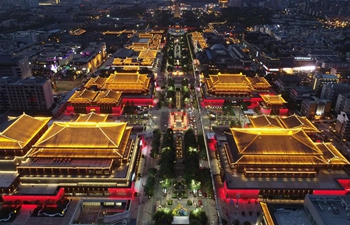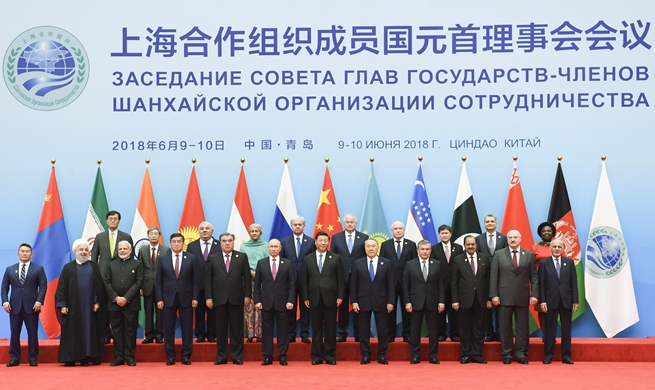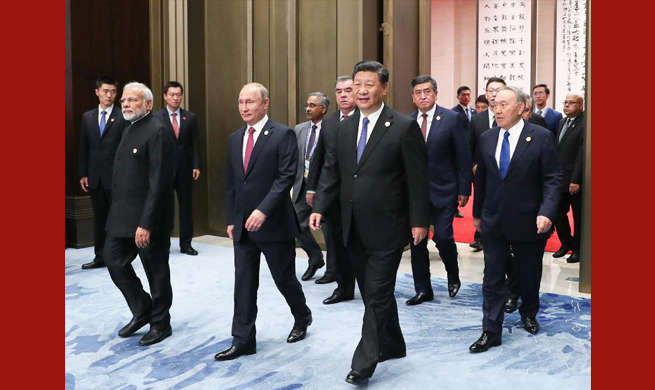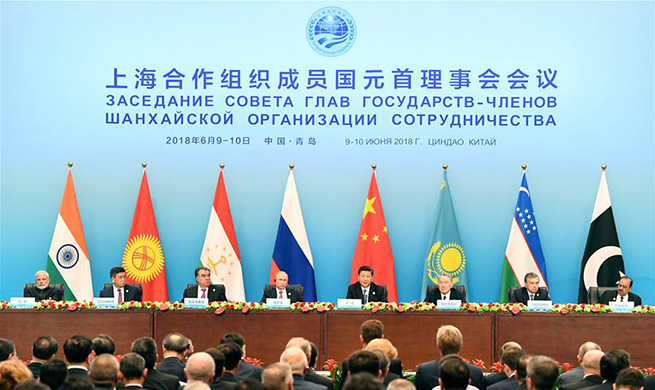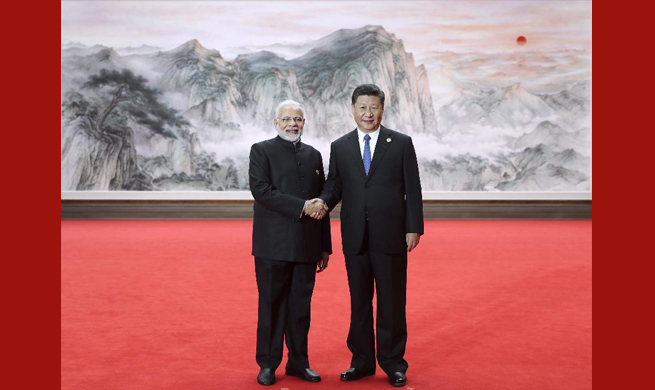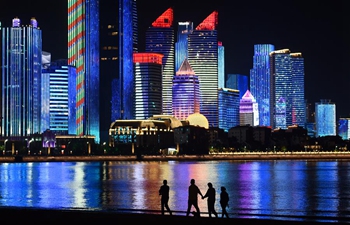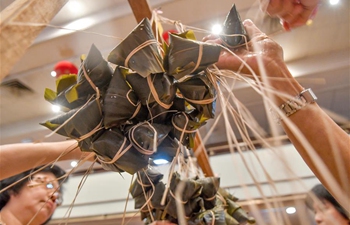SINGAPORE, June 11 (Xinhua) -- Top leader of the Democratic People's Republic of Korea (DPRK) Kim Jong Un and U.S. President Donald Trump will meet in Singapore on Tuesday for a landmark summit, the first between incumbent leaders of both countries since the end of the 1950-53 Korean War.
Denuclearization of the Korean Peninsula is expected to top the agenda of the much-anticipated Kim-Trump summit.
Here is a brief review of the nuclear issue on the Korean Peninsula.
The nuclear issue on the Korean Peninsula surfaced in the early 1990s, when the United States, based on its satellite information, suspected that the DPRK had facilities for the development of nuclear weapons.
Pyongyang denied the allegation, saying it had neither the intention nor the capability to develop nuclear weapons. It also criticized the Washington for deploying nuclear weapons in South Korea, which it said posed a threat to the its security.
From May 1992 to February 1993, the DPRK accepted six irregular inspections by the International Atomic Energy Agency (IAEA), the nuclear nonproliferation watchdog affiliated to the United Nations (UN).
Under the Framework Agreement signed in Geneva in October 1994, Pyongyang agreed to freeze its nuclear program in exchange for the construction of light-water reactors and fuel oil provided by a U.S.-led Korean Peninsula Energy Development Organization to make up for the shortage in electricity in the DPRK due to the suspension of its nuclear plan.
In October 2002, the United States said the DPRK had admitted that it had a program to enrich uranium after U.S. special envoy James Kelly visited the country. The DPRK responded by claiming that it had the right to develop nuclear weapons and weapons even more powerful.
In December 2002, the United States stopped shipping fuel oil deliveries to the DPRK, citing violation by the DPRK of the Geneva accord. In response, the DPRK announced an end to its nuclear freeze, removed from the frozen nuclear facilities the seals and monitoring cameras installed by the IAEA and restarted the nuclear facilities used for producing electricity.
Moreover, the DPRK released a statement in January 2003, announcing its withdrawal from the nuclear Non-Proliferation Treaty while claiming it had no intention of developing nuclear weapons.
Also in 2003, the Chinese government brokered the six-party talks involving China, the DPRK, the United States, South Korea, Russia and Japan.
The first round of the six-party talks on the Korean Peninsula nuclear issue was held in Beijing in August 2003, in which the principle of peacefully resolving the nuclear issue through negotiations had been established.
On Sept. 19, 2005, the six parties wrapped up their fourth round of talks with a joint statement in which the six parties unanimously reaffirmed the goal of verifiable denuclearization of the Korean Peninsula in a peaceful manner.
In the statement, the DPRK "committed to abandoning all nuclear weapons and existing nuclear programs" but insisted on its right to peaceful uses of nuclear energy.
The United States affirmed that it had no nuclear weapons on the Korean Peninsula and had no intention of attacking or invading the DPRK with nuclear or conventional weapons. South Korea reaffirmed its commitment not to receive or deploy nuclear weapons on the Korean Peninsula and promised there existed no nuclear weapons within its territory.
On Feb. 13, 2007, the third phase of the fifth round of the six-party talks ended in Beijing with a joint statement on the first step toward the denuclearization of the Korean Peninsula. In July, the DPRK closed and sealed its nuclear facilities in Yongbyon.
In November 2007, the DPRK began to disable three nuclear facilities in Yongbyon. However, the agreement reached on Oct. 3 had not been effectively implemented due to a divergence on the nuclear declaration between the DPRK and the United States
In June 2008, the DPRK destroyed the cooling tower at its Yongbyon nuclear complex, marking a symbolic step toward denuclearization.
On April 5, 2009, the DPRK carried out a rocket launch, raising serious concern of various sides.
The UN Security Council on April 13 adopted a presidential statement on the April 5 launch by the DPRK, saying it is "in contravention of Security Council resolution 1718" and urging the early resumption of the six-party talks.
Pyongyang subsequently announced it was quitting the six-party talks on nuclear disarmament and would restart nuclear facilities in protest of the UN statement.
On May 23, 2009, the DPRK announced it has successfully conducted the second underground nuclear test since 2006.
The test prompted UN Security Council Resolution 1874, which voiced "the strongest condemnation" against the DPRK authorities and demanded that the country stop further nuclear weapons-related activities.
On Jan. 6, 2016, the DPRK carried out its fourth nuclear test, alleged to be a successful test of its first hydrogen bomb.
In response, South Korea decided to stop operations at the Kaesong industrial complex jointly run with the two Koreas. In March 2006, the UN Security Council adopted a resolution imposing new sanctions on Pyongyang to curb its nuclear and missile programs.
The DPRK's fifth nuclear test on Sept. 9, 2016, triggered tougher sanctions from the UN Security Council.
On Sept. 3, 2017, the DPRK claimed it successfully detonated a hydrogen bomb capable of being carried by an intercontinental ballistic missile (ICBM).
Relations between Seoul and Pyongyang took a U turn since the start of 2018, rekindling the hope for a lasting peace on the Korean Peninsula.
In March 2018, Chung Eui-yong, South Korean President Moon Jae-in's top national security adviser, said the DPRK showed willingness to hold talks with the United States over denuclearization of the peninsula.
According to decisions made by the Political Bureau of the Central Committee of the Workers' Party of Korea, the DPRK said it will suspend its nuclear and ICBM tests from April 21.
On April 27, Kim Jong Un and Moon Jae-in confirmed their shared goal of realizing a nuclear-free Korean Peninsula through complete denuclearization in a declaration issued after their summit meeting at the truce village of Panmunjom.
The DPRK dismantled its Punggye-ri nuclear test site in the northeastern part of the country on May 24 ahead of the DPRK-U.S. summit scheduled for June 12 in Singapore.






